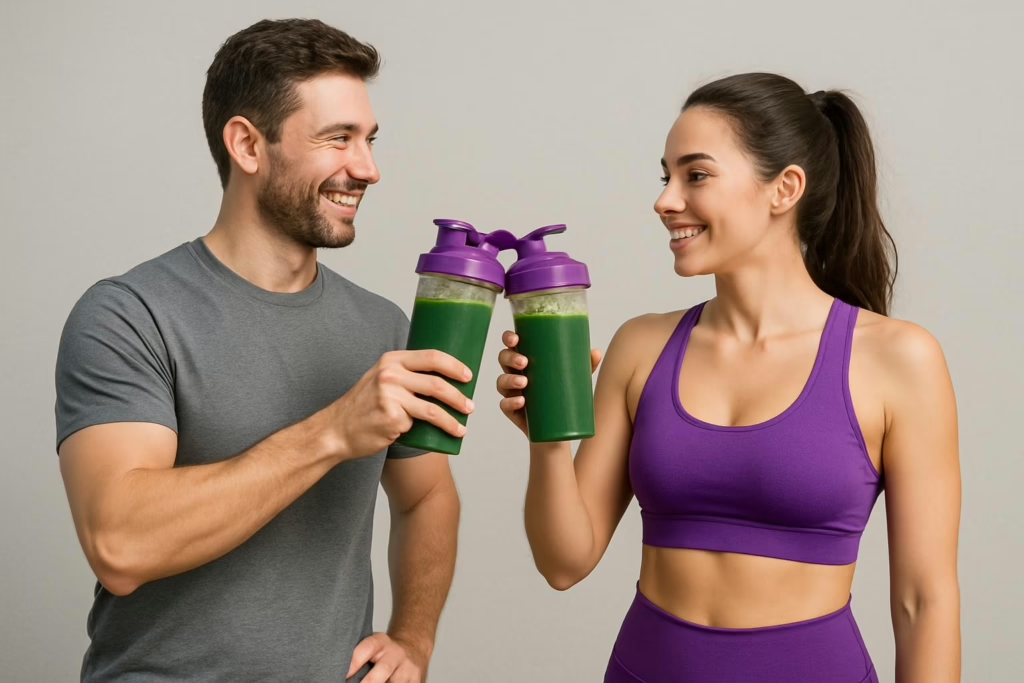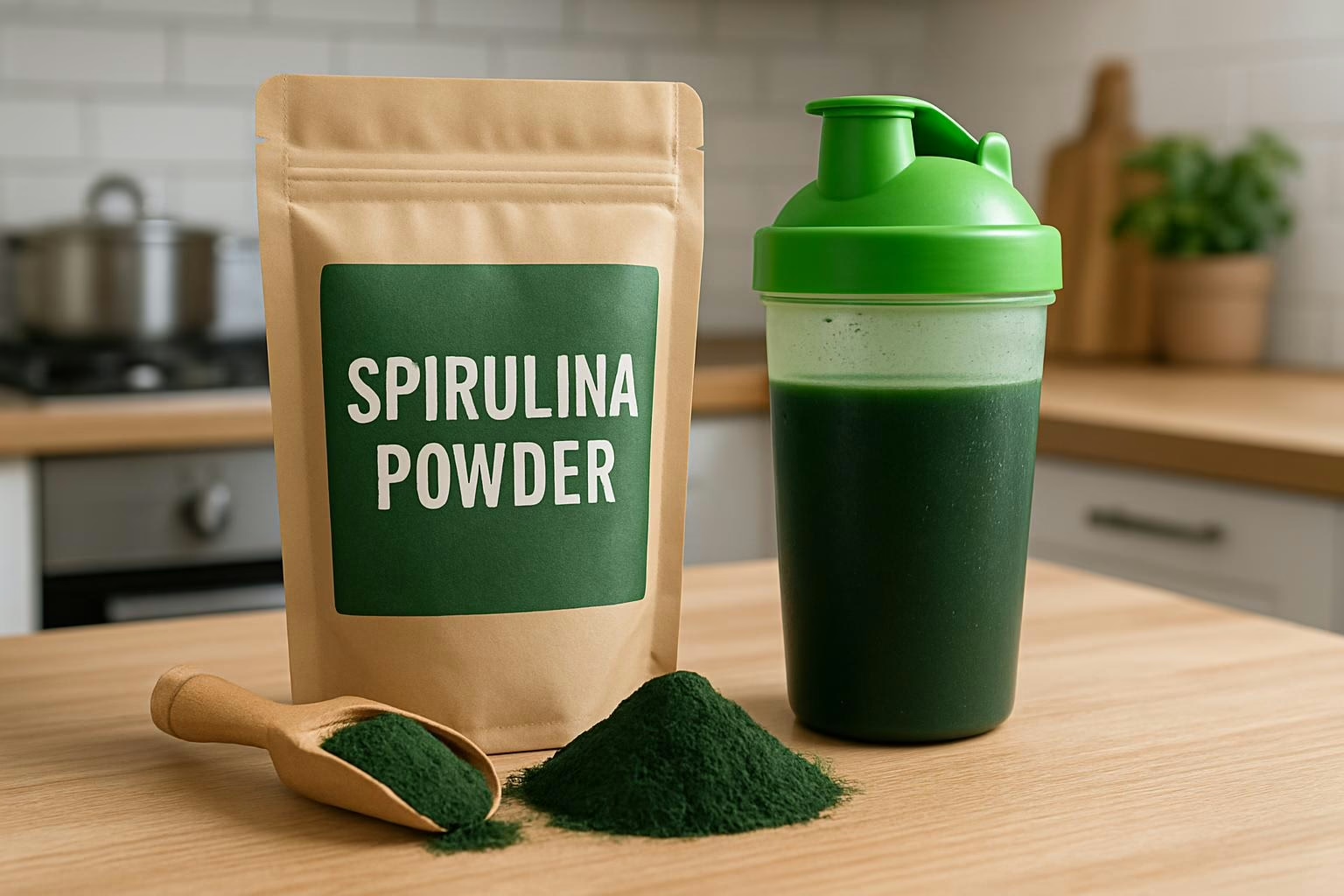
Does Spirulina Help Build Muscle And Support Athletic Ability
Spirulina powder is a popular superfood which is strongly linked with being able to help to build muscle and does possibly support improvements in athletic ability.
Spirulina is a cyanobacterium which is then powderised to make a green food supplement. Because spirulina is highly photosynthetic the powder has a green or green blue tint. They also produce impressive blooms in the ocean. A lot of the high nutrient density of spirulina comes from a massive mineral content. Spirulina is rich in minerals such as iron and manganese.
Powdered spirulina is easy to add to protein shakes as a sort of booster. Research suggests spirulina may support or does possibly help us to build muscle with or without additional protein. This may be because of a highly nutrient dense profile and the status of spirulina as a superfood which may feed our muscles during or after exercise.
Here the evidence that spirulina does possibly help us to build muscle and support with improving athletic recovery or ability will be considered to show why you may want to add this superfood to your diet.

Spirulina As A Gym Supportive Superfood
Spirulina is a very ancestral lifeform to Earth and spirulina supports the ongoing sustainability of various ocean ecosystems. This organism is a cyanobacteria which photosynthesises using the energy of the sun to make energy to live. The bright green or green blue tint to spirulina powder is because of the ability of cyanobacteria to harness the energy from the sun.
Spirulina has a very rich mineral content and this is why spirulina is thought to be a superfood. Some minerals which spirulina is rich in include iron and manganese. These nutrients and others found in spirulina may help us to build muscle after exercise while the nutrient dense profile of spirulina does possibly also support athletic ability during exercise.
Iron
Spirulina could be considered to be a superfood because of a rich mineral density. Research shows that per 100 grams of spirulina you could find 28.5mg of iron.
Iron is very important in sustaining maximum oxygen intake via red blood cells and so helps our muscles to function properly. This is because iron helps to make haemoglobin in red blood cells which is needed to transport oxygen throughout the body.
The suggested RDA of iron is 8mg a day in adult males and 18mg in adult females. Spirulina provides up to 158% of an iron RDA in females per 100 grams so a small serving should significantly contribute to our iron RDA.
Manganese
Spirulina also contains about 2mg of manganese per 100 grams with our RDA being between 2.3mg in males and 1.8g in females. A small portion of spirulina powder could certainly significantly contribute to our RDA of this mineral.
In terms of muscle exercise manganese is important in sustaining optimal muscle functioning through supporting our metabolic rate or the production of energy. Manganese deficiencies are linked to disorders in sugar metabolism and glucose tolerance which may result in impaired growth. Manganese may support healthy blood glucose levels and the use of glucose via promoting healthy insulin levels. This supports healthy energy production and energy levels during exercise.
Manganese deficiency could also lead to mitochondrial dysfunction and abnormal energy production which may result in early fatigue during exercise. Improvements in energy production support more optimal muscle functioning. This is a very subtle way that manganese from spirulina could influence or does possibly help us to build muscle with exercise.
Manganese also influences the levels of an important antioxidant enzyme called superoxide dismutase which may help with reducing exercise fatigue to the muscles and support healthy muscle recovery. This may also support muscle building.
Magnesium And Potassium
Spirulina powder also contains nearly 200 grams of magnesium per 100 grams. Our magnesium RDA is 420mg in males and 320mg in females.
This mineral is highly linked with muscle fatigue from exercise. This is possibly because of how important this electrolytic mineral is in supporting healthy muscle contractions during muscle movement. Magnesium also supports healthy production of ATP or energy. As with manganese this is important in supporting healthy muscle functioning. Again this is another way that spirulina does possibly influence healthy muscle functioning and exercise ability during exercise.
Spirulina powder also contains a high amount of the electrolyte potassium which supports healthy neuromuscular functioning and muscle movement. Without enough potassium our muscles may start to cease up or cramp. Per 100 grams there is about 1360mg of potassium in spirulina powder. While there is no standardised RDA The National Academy Of Medicine support eating 2300mg to 3000mg per day. A small serving of spirulina could support healthy potassium levels and may then contribute to healthy muscle activity with exercise.
B Vitamin And Protein Content Of Spirulina
Spirulina powder contains a very high amount of B vitamins such as thiamin and riboflavin. Spirulina is also packed with pantothenic acid or vitamin B5 and also niacin or vitamin B3. B vitamins are needed by our body to support healthy energy production within our mitochondria. This includes energy production within our skeletal muscles which we use to exercise. Healthier or improved energy production levels should naturally help us to build muscle after exercise because of a slowed rate of skeletal muscle fatigue.
Spirulina has a really dense profile of amino acids too. Amino acids make a core part of our skeletal muscle. Amino acids in our diet help muscle to recover from exercise. This is an essential process which helps the body to build muscle. Amino acids are also sometimes used as an energy source by our muscle tissues. This is another important way that spirulina supplement powder does possibly help us to build muscle.

Research With Spirulina And Muscle Building
There is a lot of new research which supports the use of spirulina to compliment or to help build muscle. The nutrient density of spirulina powder is thought to be important in supporting the optimal functioning of our muscles throughout and after exercise. The wealth of controlled nutrient studies with spirulina and their effects on exercise ability or muscle building seem to support this by showing how influential spirulina nutrients are on important factors which influence our muscles. These include oxygen carrying ability during exercise and muscle antioxidant status.

Spirulina Powder And Oxygen Carrying Capacity
One clinical trial showed that consuming spirulina powder may help to improve maximal oxygen uptake during exercise while also supporting positive changes athletic body composition. Other studies have found similar suggesting that spirulina powder supports maximal oxygen uptake at time of exercise fatigue.
Higher levels of nutrients such as iron from spirulina could contribute to oxygen carrying capacity during cardio exercise. Manganese from spirulina may optimise glucose use to encourage a positive change in body composition. There are other studies separate from this one which show that exercise and spirulina supplement use could encourage an improved body composition.
Both of these factors may support improvements in athletic ability and so spirulina does possibly help to build muscle through these influencing factors. This is supported by the same clinical study which showed that athletic individuals supplementing with spirulina could benefit from improved cardio fitness. Other studies have also found that spirulina improves athletic ability and aspects of our metabolic rate or energy production which support healthy muscle functioning.
Spirulina And Muscle Antioxidant Levels
Another study showed that spirulina powder had a beneficial effect on activity levels of the antioxidant complex glutathione peroxidase within the blood. This is one of the most important antioxidant complexes in the body required to eliminate oxidative stresses such as those produced during exercise. Oxidative stress and inflammation accelerate muscle fatigue.
Cysteine is an amino acid found in spirulina which may be able to influence glutathione levels. Other studies have also noted that spirulina consumption may support levels of this antioxidant because of a nutrient dense nutritional profile. This would also support the glutathione peroxidase antioxidant complex. This may be an important reason why the study also found there was an improvement in time to exhaustion and fatigued skeletal muscle damage when taking spirulina powder. Other studies have found that spirulina could protect the body against DNA damage from exercise caused oxidative stress.
Additional studies support this showing that spirulina powder may prevent build ups in oxidative stress and inflammation during exercise to suppress early exercise fatigue. Spirulina supplementation was also recommended by one study to support athletes with high training loads. Spirulina was shown to reduce muscle oxidative stress levels and improve muscle recovery rate. These studies show once again that spirulina may be useful in providing help to build muscle with exercise and to support athletic ability.
Overall the research clearly shows that spirulina does possibly help to support improvements in athletic ability during exercise and to build muscle because of a highly rich nutrient profile which supports muscle tissue health.

Summary
The popular superfood spirulina is strongly linked with supporting improvements in athletic ability and does possibly help to build muscle.
Spirulina is a cyanobacteria with a very rich nutrient profile. This is why spirulina powder is used as a supplement. Spirulina is a very ancient lifeform and supports the ongoing sustainability of many ocean ecosystems. Spirulina could be used to support our diet and improve our nutrient intake. Powdered spirulina is rich in various minerals which could support the optimal functioning of our muscles.
Some of the top nutrients found within spirulina include iron and manganese. These are minerals which are known to help our muscles to function as they should. Healthy iron levels support oxygen carrying to our muscle while manganese supports healthy metabolic function. Both of these factors are able to influence muscle functioning. Spirulina also provides our bodies with magnesium and B vitamins which may be preventative of muscle fatigue. The amino acid content of spirulina is also very impressive. These nutrients found within spirulina may all help us to build muscle from exercise.
Clinical research supports the use of spirulina in building muscle. Spirulina may support our muscles by improving maximal oxygen carrying capacity while also positively influencing athletic body composition. Studies have shown that spirulina could influence cardio ability. Spirulina seems to reduce time to exhaustion from exercise and may be preventative of fatiguing skeletal muscle damage. Other studies have shown that levels of oxidative stress during exercise may drop as a result of spirulina powder use.
Overall the research clearly shows spirulina supplementation does possibly help to build muscle because of a highly rich nutrient profile.
You can find more interesting articles below.





